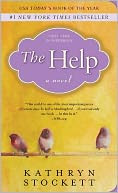NOTE – THIS IS A SECULAR TITLE
My sister loaned me her copy of this book, and I just finished it a couple of days ago. The movie is going to be released in about a week, so, I’ll probably go and see it when it comes out.
In spite of the controversy for some, I felt this book painted a realistic view for what it was like for SOME African-American maids to work for white families in the sixties. I enjoyed reading this book, but there were parts of it that rankled me, made me angry. But, I felt the author did a great job with the story.
Skeeter is 22 years old and she has graduated from college. Unmarried, she hangs out with her friends who are married with children. Skeeter’s mother is always “on her case” about her height (she’s very tall) and her unruly hair. Can’t she fix herself up so that she can snag a husband? Skeeter is sick of her mother and she’s got goals, goals that are not shared by her upper-class friends. Skeeter wants to be a writer and when she reaches out to a big-time New York editor, she comes up with an idea for a book – a book about what it’s really like to be a Black maid in the deep South.
Skeeter’s family maid suddenly disappears and her mother lies about the maid’s wherabouts. Skeeter wants to know what happened to the African-American woman who raised her. She’s stunned that the maid that they’ve employed for decades is now gone – it’s almost like losing her second mother.
Skeeter’s family as well as Skeeter’s friends all employ African-American domestic help. Aibileen, one of the maids, has been a domestic worker her entire life. I think, when you read this story, it’ll make you stop and make you think about what the life of a maid is really like. They cook, clean, and they also raise the children of their White employers. They’re not really appreciated for all that they do.
You’ll meet a cast of interesting characters who struggle with bigotry and fear. Minny, another maid, has problems that she’s dealing with at home – her homelife is sad and she has trouble keeping domestic jobs because of her sassy attitude. She finally finds a job with Ms. Celia, a white woman who is the social outcast of Jackson Misssissippi since she is little more than “poor white trash” who “stole” the boyfriend of one of the town’s elite.
Skeeter and the maids are fearful, but feel that changes need to be made, so she sets out to write the stories about the maids in her town. Skeeter wants others to know about what the maids have to go through each day doing their jobs. Most times, their White employers are unsympathetic, demeaning, and they treat their help with no respect.
One particular thing comes to mind to illustrate how the maids are disrespected – many of their employers get a separate bathroom contructed onto their homes because they feel that Blacks have diseases to which whites are not accostomed to. I found the views of many of the Whites in the book to be downright stupid. How are you going to have a Black maid fixing your food, raising your children, and then worry about catching a disease from using the same toilet?
The Help takes place during the sixties in Jackson Mississippi and there is an extreme amount of racial unrest during this time in history. Martin Luther King is about to lead the March in Washington. People are getting lynched and shot just for standing up for their civil rights.
I could go on and on talking about this book, but I don’t want to give spoilers. My only pet peeve about this novel is that Skeeter hangs out with her best friends – apparantly, they used to be extremely close. However, now that closeness is being shattered. I had a hard time believing that these Skeeter and her friends had been close at one point? Why? Not sure. Once the story opens, that closeness has faded, so, since I never “experienced” the closeness amidst the pages in the book, it could be why I’m having a hard time accepting that Skeeter was close to her friends?
Overall, the book was a quick, good, engaging read and I highly recommend this controversial book.
~Cecelia Dowdy~
From the back cover:
Twenty-two-year-old Skeeter has just returned home after graduating from Ole Miss. She may have a degree, but it is 1962, Mississippi, and her mother will not be happy till Skeeter has a ring on her finger. Skeeter would normally find solace with her beloved maid Constantine, the woman who raised her, but Constantine has disappeared and no one will tell Skeeter where she has gone.
Aibileen is a black maid, a wise, regal woman raising her seventeenth white child. Something has shifted inside her after the loss of her own son, who died while his bosses looked the other way. She is devoted to the little girl she looks after, though she knows both their hearts may be broken.
Minny, Aibileen’s best friend, is short, fat, and perhaps the sassiest woman in Mississippi. She can cook like nobody’s business, but she can’t mind her tongue, so she’s lost yet another job. Minny finally finds a position working for someone too new to town to know her reputation. But her new boss has secrets of her own.
Seemingly as different from one another as can be, these women will nonetheless come together for a clandestine project that will put them all at risk. And why? Because they are suffocating within the lines that define their town and their times. And sometimes lines are made to be crossed.
In pitch-perfect voices, Kathryn Stockett creates three extraordinary women whose determination to start a movement of their own forever changes a town, and the way women—mothers, daughters, caregivers, friends—view one another. A deeply moving novel filled with poignancy, humor, and hope, The Help is a timeless and universal story about the lines we abide by, and the ones we don’t.















